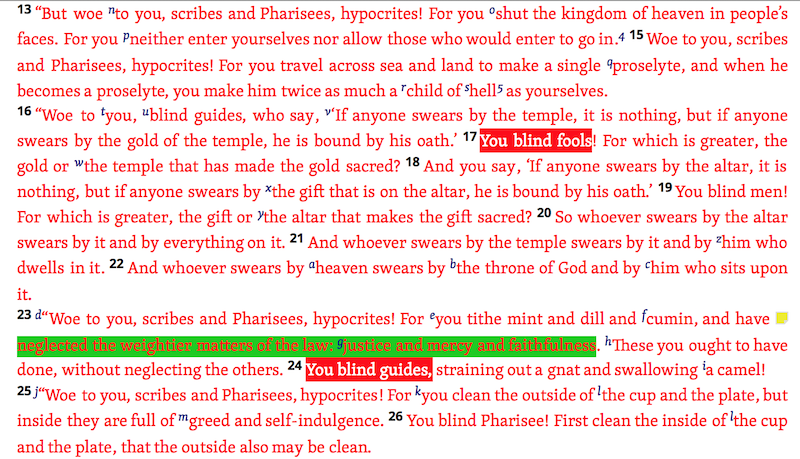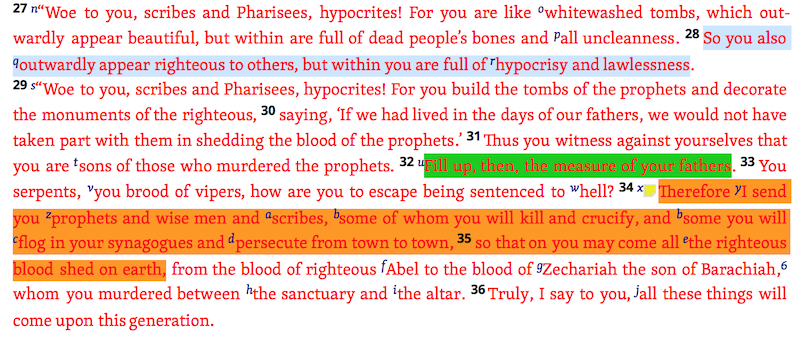The Rainbow Scaffold in Matthew, part 2
 (Green)
(Green)
Christ notes the weights and measures he, as Judge, will compare them to: Justice, Mercy and Faithfulness.
The scribes and Pharisees would weigh out the exact amount they owed to God. Christ points out how useless that exact measurement was compared to the weight of their sin.
Throughout Scripture, God uses math terms to show that he is measuring and weighing our deeds, comparing them to a standard. Knowing that “average” is not good enough is crucial for salvation. You have to match his requirements. Exactly.
The only way to meet his requirements is by going DOWN, and Christ will lift you up. Listening to Christ we can find how to clean the inside of the cup. By kissing the Son, by being found in him, we can gain a different category.
Appearances do not cut it (v.28). God is using his own standards, which will result in failure and condemnation.
In verse 32, the word “measure” refers to a scale God is using to weigh out the punishment the “fathers” had earned, and if the scribes and Pharisees did not repent that measure would be theirs as well.
Because they were sentenced to hell, “therefore” (v.34) God sent them prophets, to warn them.
Below, in verse 2 we see hints of that greater Temple Christ was going to build, the [biblegateway passage=”Hebrews 11:10″ display=”City not built with human hands”]. Ezekiel’s Temple, which was made up of the faithful who had been [biblegateway passage=”Ezekiel 43:10-12″ display=”measured and approved”].
You are being measured and tested. Do you know how to measure up? Do you know what God is looking for?
 (Orange) CON
(Orange) CON
God’s Covenant is a Separation Filter. The requirements of the Covenant will push people into a camp, reflecting their essential character.
Are you drawn to the Covenant-keeping God, or are you repulsed by him and his people?
In verses 34-35, Christ points out that truth-speaking prophets and wise men have been sent, and will be sent.
Note, Christ states he himself will send the prophets, and that his prophets will be equal both to Abel, the first prophet, and to all those who were mistreated in the Old Testament. He is declaring his divinity here! (Character of God, blue)
Those who carry a Covenant message present onlookers with a choice.
Will you bend to the words they carry? Will you show them respect and love? Or will you hurt them?
How we treat the Church of Christ reflects who we are. In this case, those who come are broken men who have been required to carry a message. Old Testament prophets always claimed a feeling of unsuitability to the task, yet they obeyed.
How do you treat those who carry the Covenant message? Christ has chosen his Church, faulty as it is, to carry something precious. “But we have this treasure in jars of clay, to show that the surpassing power belongs to God and not to us.” ([biblegateway passage=”2 Cor 4:7-9″]). Ambassadors of the King, while not the king, are to be treated as the representative of that King.
Look below at verse 37. We hear echoes of the story two chapters earlier ([biblegateway passage=”Matt 21:33-41″]), where the prophets and the son himself are killed by those tending the vineyard.

(Orange) GOD–next verses–



